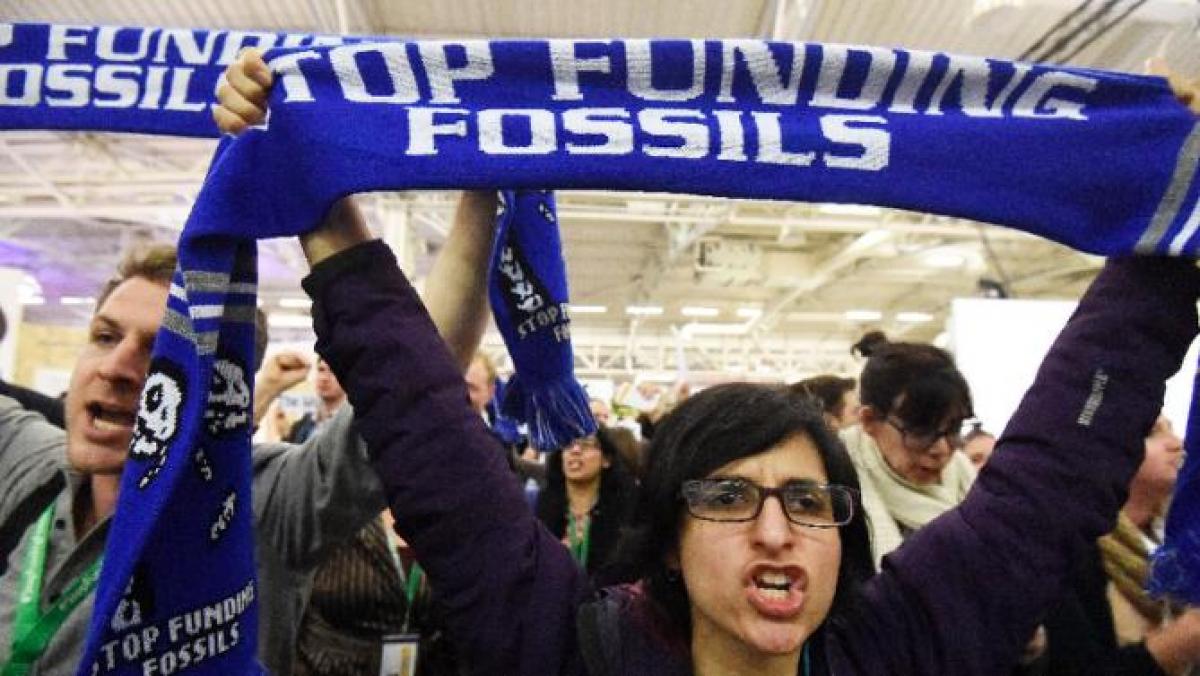Live
- TGPSC all set for holding Group-III exams
- Delays dog LRS cases as applications pile-up
- TGSPDCL deploys 101 ERT vehicles
- JIH to host national conclave in city
- OU celebrates National Library Week with book exhibition
- Prakash Utsav to be celebrated today
- Survey staff turn a blind eye towards apartment dwellers
- Assembly to resolve on Constitutional amendment on age limit for legislators
- Govt to hold three public meetings for ‘People’s Govt—Victory Celebrations’
- SBI staff’s presence of mind averts digital arrest scam
Just In

x
Highlights
Rich and poor nations launched a flurry of well-drilled diplomatic punches on Wednesday in a final Paris showdown aimed at securing an elusive accord to save mankind from disastrous global warming.

Le Bourget: Rich and poor nations launched a flurry of well-drilled diplomatic punches on Wednesday in a final Paris showdown aimed at securing an elusive accord to save mankind from disastrous global warming.
More than two decades of bruising international diplomacy have failed to produce such a deal, which would require the world's energy system to cut back on the use of coal, oil and gas that releases planet-warming gases.
The 195-nation UN talks in the French capital have been billed as the last chance to avert the worst consequences of climate change: increasingly severe drought, floods and storms, as well as island-engulfing rising seas.
After nine days of tense negotiations, French Foreign Minister and conference host Laurent Fabius released a draft of the final accord on Wednesday to be used as the basis for a frenetic final 48 hours of talks.
"I am convinced we can reach a deal but to do so we must unite our forces and set our compass on the need for compromise," Fabius told the delegates, mostly environment and foreign ministers.
Deep divisions -- primarily between developing and developed nations -- over how to pay for the costly shift to renewable forms of energy, such as solar and wind, have bedevilled the UN climate process.
The streamlined text released by Fabius eliminated hundreds of relatively minor points of dispute, and reflected a sense of co-operation from all sides in Paris rarely seen in the UN climate negotiating halls.
After its release, delegates and long-time observers said they were cautiously optimistic an accord could be reached by Friday's deadline at a sprawling conference venue in Le Bourget on the northern outskirts of Paris.
But all of the biggest arguments had yet to be resolved.
Decisive Moment
"This is the decisive moment," French President Francois Hollande said in Paris. "We are not there yet. We are on the track. I hope the good track, but we know there is resistance, questions coming from (various) countries."
Immediately after the start of an expected all-night session on Wednesday night to debate the draft accord, a host of nations stepped up to voice entrenched positions they warned could derail the effort.
"Many options cross our red lines," Luxembourg negotiator Carole Dieschbourg, representing the European Union, told the other delegates. One of the key battle lines is what target of global warming to enshrine in the accord, which would take effect in 2020.
Many nations most vulnerable to climate change want to set a goal of below 1.5 degrees Celsius (2.5 degrees Fahrenheit) compared with pre-Industrial Revolution levels. However many big polluters, such as the United States, China and India, would prefer a cap of less than 2C, which would allow them to burn more fossil fuels for longer.
Barbados's Environment Minister, Denis Lowe, representing a bloc of Caribbean nations that are among the most vulnerable to rising sea levels, said 1.5C was non-negotiable. "We will not sign off on an agreement that represents the certain extinction of our people," Lowe said.
Many other ministers echoed their nations' long-held positions. Still, most also said the draft was an acceptable blueprint to work from, and they were prepared to continue negotiating.
Billion-dollar deal-busters
One of the biggest potential deal-busters remains money. Rich countries promised six years ago in Copenhagen to muster $100 billion (92 billion euros) a year from 2020 to help developing nations make the costly shift to clean energy, and to cope with the impact of global warming.
But how the pledged funds will be raised still remains unclear -- and developing countries are pushing for a promise that the amount will be ramped up in future. Meanwhile, rich nations are insisting that developing giants work harder to tackle their greenhouse gases, noting that much of the world's emissions come from their fast-growing economies.
Most nations submitted to the UN before Paris their voluntary plans to curb greenhouse gas emissions from 2020, a process that was widely hailed as an important platform for success. But scientists say that even if the cuts were fulfilled, they would still put Earth on track for warming of at least 2.7C.
One of the remaining battle fronts in Paris is a debate over when and how often to review those national plans, so that they could be "scaled up" with pledges for deeper emissions cuts. But some developing nations insist they should not be pressured into deeper cuts.
Despite the hurdles, long-time observers said a deal could be reached in Paris. "Our sense is that almost everything we need for an ambitious, equitable agreement is still in play," Jennifer Morgan, global director of the climate programme at the World Resources Institute, told reporters.
"But there is clearly an immense amount of work to be done in the coming hours."

Next Story
More Stories
ADVERTISEMENT
© 2024 Hyderabad Media House Limited/The Hans India. All rights reserved. Powered by hocalwire.com







